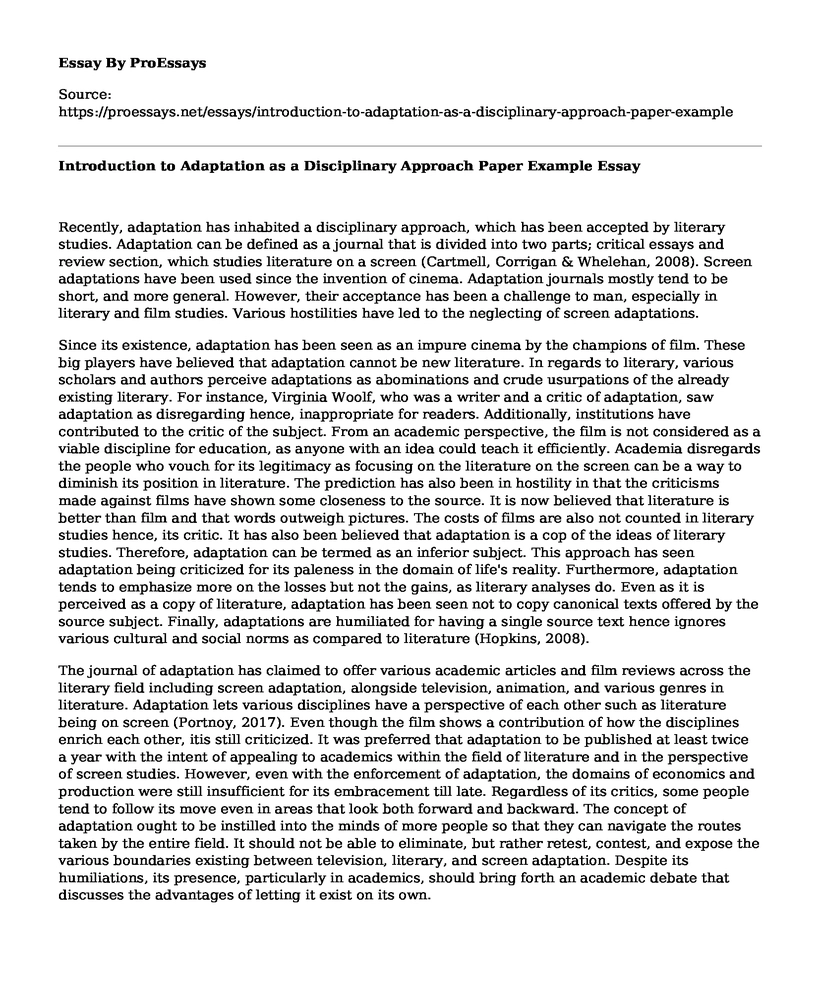Recently, adaptation has inhabited a disciplinary approach, which has been accepted by literary studies. Adaptation can be defined as a journal that is divided into two parts; critical essays and review section, which studies literature on a screen (Cartmell, Corrigan & Whelehan, 2008). Screen adaptations have been used since the invention of cinema. Adaptation journals mostly tend to be short, and more general. However, their acceptance has been a challenge to man, especially in literary and film studies. Various hostilities have led to the neglecting of screen adaptations.
Since its existence, adaptation has been seen as an impure cinema by the champions of film. These big players have believed that adaptation cannot be new literature. In regards to literary, various scholars and authors perceive adaptations as abominations and crude usurpations of the already existing literary. For instance, Virginia Woolf, who was a writer and a critic of adaptation, saw adaptation as disregarding hence, inappropriate for readers. Additionally, institutions have contributed to the critic of the subject. From an academic perspective, the film is not considered as a viable discipline for education, as anyone with an idea could teach it efficiently. Academia disregards the people who vouch for its legitimacy as focusing on the literature on the screen can be a way to diminish its position in literature. The prediction has also been in hostility in that the criticisms made against films have shown some closeness to the source. It is now believed that literature is better than film and that words outweigh pictures. The costs of films are also not counted in literary studies hence, its critic. It has also been believed that adaptation is a cop of the ideas of literary studies. Therefore, adaptation can be termed as an inferior subject. This approach has seen adaptation being criticized for its paleness in the domain of life's reality. Furthermore, adaptation tends to emphasize more on the losses but not the gains, as literary analyses do. Even as it is perceived as a copy of literature, adaptation has been seen not to copy canonical texts offered by the source subject. Finally, adaptations are humiliated for having a single source text hence ignores various cultural and social norms as compared to literature (Hopkins, 2008).
The journal of adaptation has claimed to offer various academic articles and film reviews across the literary field including screen adaptation, alongside television, animation, and various genres in literature. Adaptation lets various disciplines have a perspective of each other such as literature being on screen (Portnoy, 2017). Even though the film shows a contribution of how the disciplines enrich each other, itis still criticized. It was preferred that adaptation to be published at least twice a year with the intent of appealing to academics within the field of literature and in the perspective of screen studies. However, even with the enforcement of adaptation, the domains of economics and production were still insufficient for its embracement till late. Regardless of its critics, some people tend to follow its move even in areas that look both forward and backward. The concept of adaptation ought to be instilled into the minds of more people so that they can navigate the routes taken by the entire field. It should not be able to eliminate, but rather retest, contest, and expose the various boundaries existing between television, literary, and screen adaptation. Despite its humiliations, its presence, particularly in academics, should bring forth an academic debate that discusses the advantages of letting it exist on its own.
References
Cartmell D., Corrigan T. & Whelehan I. (2008). Introduction to Adaptation. Adaptation, 1(1):1-4. doi: 10.1093/adaptation/apn015
Hopkins, L. (2008). Shakespeares The Tempest: The Relationship between Text and Film. London: Methuen Drama.
Portnoy, K. (2017). Screen Adaptation: A Scriptwriting Handbook. S.l.: CRC PRESS.
Cite this page
Introduction to Adaptation as a Disciplinary Approach Paper Example. (2022, Aug 23). Retrieved from https://proessays.net/essays/introduction-to-adaptation-as-a-disciplinary-approach-paper-example
If you are the original author of this essay and no longer wish to have it published on the ProEssays website, please click below to request its removal:
- Essay Sample on Learning About Death Through Television
- Artists View Photography Essay
- Literary Analysis Essay on 'Sisters' by Kollontai
- Essay on Writing Process: Combining Knowledge & Understanding for Effective Writing
- Merchant of Cool: Fresh Looks Triggering Teen Trends - Essay Sample
- Essay Example: 'A Talk to Teachers' by James Baldwin
- Essay Sample on My Encounter With Alien Abduction: A True Story







